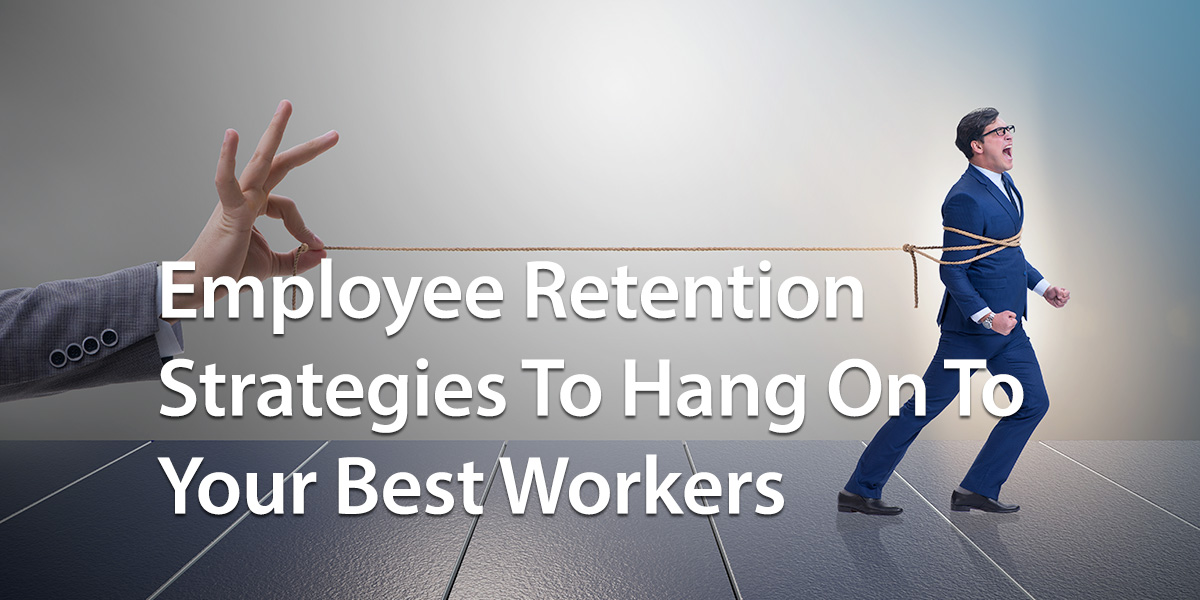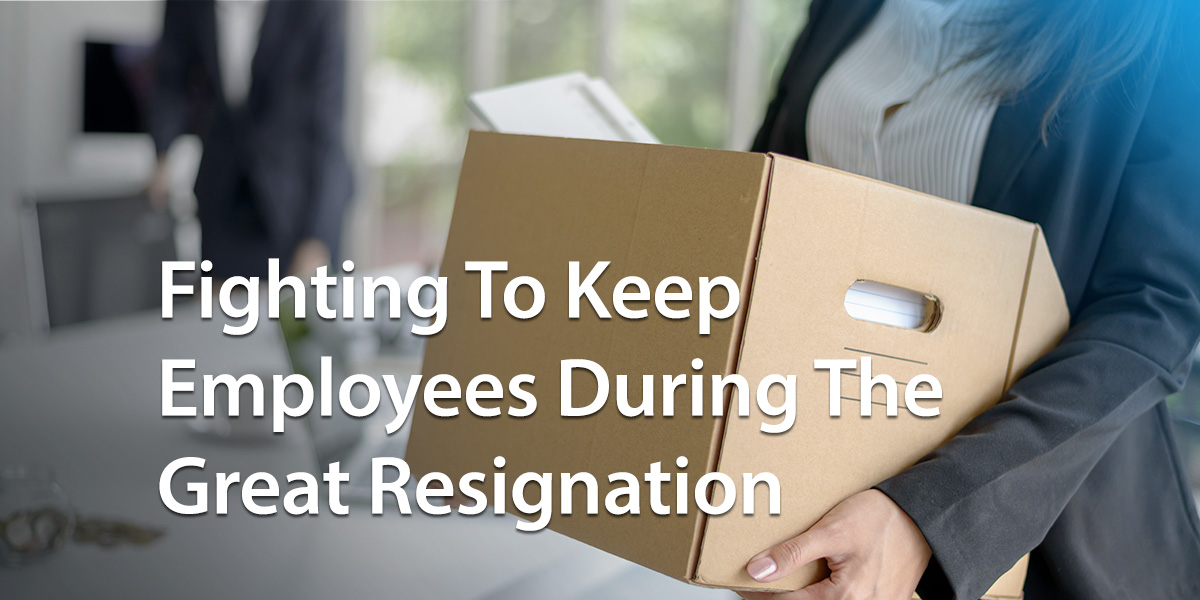What started in late 2020 with a rapid explosion of pandemic-flamed turnover rapidly grew to be a long-lasting phenomenon. Dubbed the Great Resignation, it’s still affecting all industries and job categories. Employee retention is now a hot topic across the globe. And every human resource management professional knows it’s more cost-effective to hang on to your best workers than recruit new talent.
So, what can businesses do about it? How can you ensure employees feel valued, so new pastures do not tempt them? If you are having a tough time keeping top talent, these five employee retention strategies could turn the tide.
Why Are Employees Leaving?
Before you start implementing your employee retention strategies, it’s vital to understand why employees leave. Every individual will have their own reasons. However, there are some common driving forces behind the Great Resignation:
- A desire for a better work-life balance
- Unclear career paths
- Poor talent development
- Inadequate salary
- Ineffective employee engagement
- Feeling overworked, burnout, or undervalued
- More compelling job opportunities elsewhere
The bottom line is the stress and anxiety of the pandemic caused many workers to re-evaluate their priorities. All-round job satisfaction has taken a deep dive, and employees are voting with their feet out the door.
Understanding where your workforce is at is crucial. An exit interview with a departing employee provides rich insights into your company culture and employee job satisfaction. Employee feedback will help you determine whether your retention strategies need improvement. Exit interviews are one valuable weapon in your arsenal. However, people managers should also regularly check in with direct reports using surveys and pulse checks.
How To Create Your Own Employee Retention Strategy
Each organization has different needs, and certain employee retention strategies will make more sense than others.
Here we share 13 ideas to kickstart retention efforts in your company. Even when you are unable to provide all your employees’ needs in every area, you can still work towards keeping hold of your top talent. Consider these ideas as building blocks towards building a comprehensive retention strategy.
Offer Competitive Base Salaries or Hourly Wages
It’s not all about the money, but it certainly helps. Employees expect a fair wage for a fair day’s work. However, rising inflation has impacted workers’ salaries in real terms, leaving many feeling undervalued and unappreciated. According to data from the Society for Human Resource Management, 32% of employees quit their jobs for higher compensation.
Regularly review your salary structure to ensure you are competitive. You will likely lose your best workers if your wages are not in line with industry norms.
Remember, hiring and training a new worker costs a whole heap more than increasing the wages of an existing one. And if your business can’t afford pay raises right now, think about alternatives such as bonuses or other benefits.
Invest In Employees’ Careers
In one survey, a whopping 94% say they are more likely to stay with their employer when the company invests in their professional development. Employees leave when they can’t see a clear career path.
The current economic environment is where employers understand the need for sharp skills for their businesses. Organizations can help employees develop new skills by providing structured training or mentorship programs and investing in additional education.
Online professional development helps companies improve employee retention and retrain employees. Plus, it has the bonus of being compatible with employees’ personal obligations.
And consider introducing a policy of promoting from within. Employees can quickly become disheartened and disillusioned when you continue to recruit external new hires. Instead, look to promote succession planning and talent development initiatives. And consider advertising opportunities internally first.
When it comes to employee retention, prioritizing professional development is a game changer.
Optimize Your Benefits Package
An employee’s salary or wage is only one part of the equation. Your overall benefits package is just as important in today’s tight job market. For many employees, benefits like subsidized healthcare or childcare, generous carer’s leave, or more paid time off can stop workers’ heads from being turned by competitors.
And remember, every team member is different. A one-size-fits-all approach is unlikely to hit the mark when five generations are working in the organization. Maximize the impact by tailoring your perks to individual employees.
Let Your Employees Work From Home
Remote work is here to stay, and employees like it that way. According to Owl Labs State of Remote Work 2022 survey, 66% said they would immediately start looking for a new job if their employer longer offered remote working.
Furthermore, remote work has been proven to deliver a healthy work-life balance and increase employee productivity. Modern technologies have made working remotely easier than ever, so there’s no excuse for not jumping on board.
Provide Flexible Scheduling and Reduced Workdays
Fully remote work is not always an option for every business. The next best thing for work-life balance is flexible schedules and hybrid arrangements.
Employers offering flexibility have significantly higher retention than those that don’t. Furthermore, Forbes reports that tenured employees with fully flexible schedules are 29% more productive.
It’s clear that the ability to work remotely or flexibly has no impact on employee productivity. In fact, it’s the opposite. And you will also reap the rewards when it comes to stopping the flow of employees leaving.
Recognize and Reward Your Employees for Their Work
Employee satisfaction is closely linked to a strong company culture and positive work environment. According to one survey, 79% of respondents who quit their jobs say a lack of appreciation is a deciding factor.
Recognizing and rewarding employees for a job well done isn’t hard to do nor is it expensive. Cost-effective options include peer-to-peer shout-outs, team or employee of the month programs, or a public thank you from the vice president.
Investing time and energy in celebrating the big and small wins will pay dividends in addressing the Great Resignation.
Create a Culture That Employees Want To Be Part Of
When it comes to effective employee retention strategies, another key tactic is creating a good company culture.
Culture is a significant factor in employee satisfaction. Glassdoor found that culture is vital in determining whether an employee stays with an organization. Most employees said a strong culture was the reason for not moving from one company to another.
So, in the fight to keep valued employees, improving your company culture is a priority. Ways to do so include the following:
- having a strong emphasis on diversity, inclusiveness, and equity
- well-defined mission and values that resonate with employees
- job descriptions that are closely aligned with the company mission
- supportive leadership
- seeking and valuing employees’ feedback
Focus On Communication
One big takeaway from the Great Resignation is that employers need to communicate and listen to employees more. Where there are information gaps, people tend to make assumptions – and this is often negative.
The relationship between people managers and direct reports is critical here. And it’s even more so when they are not in the same building. Leaders and supervisors should check in regularly with their entire team on a professional and personal level. They can use these conversations to communicate expectations, answer employees questions and pass on any messages from the top.
And on a corporate level, make sure you create channels for honest feedback and two-way conversations. Some of the available tools include interactive blogs, employee surveys, team chat and town hall meetings.
Champion Employees Wellness
The stresses and strains of the pandemic thrust the whole issue of mental health and wellbeing into the spotlight. After all, fit and healthy employees are good for business.
Many companies expanded and improved their wellness offerings during Covid-19 to relieve anxiety and support staff. Wellness offerings demonstrate how much you value employees. And even though the worst of the pandemic is behind us, now’s not the time to take your foot off the pedal.
If you haven’t already, look to introduce wellness programs like stress management workshops, retirement planning services, on-site health checks, or fitness classes. Even access to online wellness or mindfulness platforms can help employees refocus and restore. Furthermore, allowing employees additional sick leave or paid time off for their mental health are also possibilities.
Reduce Employee Burnout
Gallup reports that about three in four US workers experience burnout on the job at least sometimes. Employees feel burnout when they are overloaded, internal communication could be better, and managers are unsupportive.
Red flags include increased absenteeism, withdrawal from colleagues and managers, and reduced productivity.
To improve retention, employers must take action to restore a better work-life balance for employees. Remote work and hybrid arrangements are obvious steps to take. So too, are better all-around employee engagement, consistent and more effective leadership, and active wellness initiatives.
Prioritize The Onboarding Process For New Employees
Employee retention starts the moment new hires walk through the door. Ensuring your new employee has a positive, engaging onboarding process is the first step in the retention battle.
So, put your best foot forward with a comprehensive, consistent program. You want to motivate employees with a dynamic experience that brings your culture and values to life. New employees become productive faster. And they will better understand the bigger picture and be more invested in company success.
From day one, the support you offer recruits sets the tone for their entire tenure at your company. And that’s why it’s such a critical employee retention strategy.
Build A Team Mentality
Teamwork is critical to cementing those social relationships that are the foundation of every successful organization. And with remote and hybrid working, employers must work harder to foster team spirit.
Digital channels like team chat can fill the gaps. Dedicated #channels for casual conversations ensure all workers stay connected, regardless of location. And cross-team collaborations improve job satisfaction with opportunities to learn new skills with different colleagues.
Support Managers And Develop Leaders
Did you know that 82% of US workers would consider leaving their jobs because of a poor manager? There’s a lot of truth in the old saying employees quit their managers, not their jobs.
Supporting managers and developing leaders is one of the best things you can do to retain employees.
And the good news is leadership skills can be learned. Offer training and development opportunities to company managers at all levels, especially those in charge of remote teams. Managers that know how to get the best out of their employees are worth their weight in gold. So, investing in management training and development will pay dividends in employee retention.
Employee Retention Strategies: Main Takeaways
In the wake of the Great Resignation, keeping your best employees is more challenging than ever. However, it’s a fight worth taking on. Hiring and training a new worker is significantly more expensive than raising an existing employee’s salary.
Workers are quitting for a variety of reasons. However, there’s no doubt the pandemic has unleashed a general restlessness in the workforce. Employees feel undervalued and want more flexibility and a better work-life balance. Your employee retention strategy should be focused on addressing the following main driving forces:
- Ensuring you have competitive salaries, benefits, and perks
- Creating a good culture where people feel valued and want to come to work
- Promoting employee professional development and encouraging your people to grow
And if this all sounds like a massive mountain to climb, take it one step at a time. The employee retention strategies we have shared are building blocks toward a comprehensive solution.
If you enjoyed reading this post, check out our blog for more insights on today’s hot topics.
About MyHub
We are a leading supplier of cloud-based intranets used by hundreds of worldwide businesses of all shapes and sizes. MyHub’s fully customizable platform is designed by the experts for the non-expert. Super easy to set up and manage, we guarantee to deliver your complete intranet in 40 days or less.
Find out more with a free demo or 14-day no-obligation trial.











